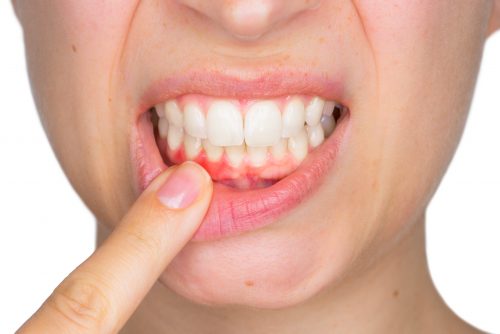
About 47% of adults over the age of 30 have some form of periodontal disease. Early stages of gum disease called gingivitis, may go undetected as patients typically don’t show any symptoms. As the disease progresses, the symptoms become more severe and can lead to serious health complications if treatment is delayed.
Periodontics is the area of dentistry that focuses on the prevention, diagnosis, and treatment of periodontal disease. If caught early on, gingivitis can be reversed. However, once the disease progresses to periodontitis, you’ll need to schedule more frequent appointments to rid your mouth of the infection and restore your oral health.
Causes of Periodontal Disease
When bacteria builds up on the teeth, it forms plaque and eventually hardens into tartar. Tartar can penetrate below the gumline, causing a gum infection known as periodontal disease. There are various risk factors that increase your risk of periodontal disease, such as:
- Smoking
- Diabetes
- Poor oral hygiene
- Stress
- Family history
- Orthodontic issues
- Certain autoimmune diseases
- Chronic dry mouth
- Faulty bridges and fillings
- Pregnancy or the use of oral contraceptives
Symptoms of Periodontal Disease
Once periodontal disease progresses from gingivitis to periodontitis, you’ll begin noticing symptoms such as:
- Persistent bad breath
- Red or swollen gums
- Gums that bleed
- Loose teeth
- Receding gums
- Tooth mobility
Periodontitis is a serious health issue that can lead to tooth decay and eventual tooth loss if left untreated. If you have periodontal disease, you’ll want to contact our office immediately so that we can get rid of the infection and restore your oral health.
Treating Periodontal Disease
Gingivitis can be reversed with a professional cleaning and a regular oral hygiene routine that consists of brushing twice a day, flossing daily, and rinsing between meals. However, periodontitis will need to be addressed with a deeper cleaning known as scaling and root planing.
During scaling and root planing, Dr. Mischissin uses special tools to scrape off the plaque and tartar from your teeth and below the gumline. Then, she’ll smooth the roots of your teeth. Within one to two weeks, your symptoms will resolve and you’ll be pain-free.
We Treat Gum Disease at Gentle Dental
With a simple in-office treatment, we can get rid of the pain associated with periodontal disease and restore your oral health. Schedule an appointment with Dr. Mischissin by calling (609) 465-4411. We’ll stop the infection in its tracks and prevent the disease from progressing.
Frequently Asked Questions
Untreated periodontal disease can cause tooth and bone loss. It’s also been linked to serious health consequences such as:
- Alzheimer’s disease
- Heart disease
- Type 2 diabetes
- High blood pressure
If you have periodontal disease, schedule an appointment with our office by calling (609) 465-4411. It’s vital to seek treatment right away so we can restore your oral health and decrease your risk of developing more serious health issues.
In the early stages of periodontal disease, your teeth will typically be fine. After the deep cleaning, you can expect your gums and teeth to begin feeling pain-free and healthy again. If the disease progresses to advanced periodontal disease, you may experience bone loss and require surgery to get rid of the infection.
Treating gum disease right away will help prevent more complicated and expensive treatments in the future. If you lose any teeth due to the effects of periodontal disease, dental implants are the gold standard for replacing missing teeth and are the only restoration procedure that improves bone density.
Dr. Mischissin will be happy to discuss your tooth replacement options so you have all the information to make an informed decision.
Gum disease typically has a gradual onset that takes place over the course of a few years. Depending on the cause, it can also have a sudden onset. For example, poor oral hygiene habits will usually take a few years before turning into gum disease. However, hormonal changes and certain disorders can increase your risk of rapidly developing the disorder.
No, once your gums begin to recede, they won’t grow back. However, treating gum disease can prevent them from receding further. If you’re concerned about the appearance of receding gums, a gum graft surgery or a pinhole surgical technique can improve the appearance and protect your gums.

